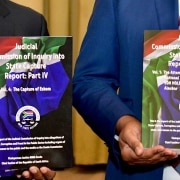|
Getting your Trinity Audio player ready...
|
Dear Corruption Watch, So many immigrants seeking refuge, opportunity and a future in South Africa are greeted with contempt and “xenophobia” that it’s a wonder we still have so many applications for asylum.
But I’m hearing that in addition to such indignities, refugees must pay bribes to become documented aliens. Don’t our laws protecting people’s rights extend to immigrants?
Sincerely,
Guardian
Dear Guardian
Our laws do indeed protect foreigners. People often come to South Africa seeking asylum or refugee status due to events over which they have no control. They have fled their homes as a result of persecution, human rights violations and conflict. Added to these horrors is the trauma associated with displacement to a foreign country.
While every state’s territorial sovereignty entitles it to control the entry of aliens, international law obliges to respect basic human rights in its treatment of anyone entering its jurisdiction. Under the constitution, a foreigner here is entitled to all the fundamental rights entrenched in the Bill of Rights, except those expressly limited to citizens.
The protracted length of time involved in obtaining legal documentation is a factor that compounds the vulnerability of foreigners and exposes them to the abuses of power alluded to in your question.
Every person wishing to obtain refugee status must apply in person at a refugee reception office administered by the Department of Home Affairs. After applying, the asylum-seeker must receive an asylum-seeker permit. This permit is essential if the aspirant resident is to be able to live, work and function before he is given refugee status.
Until the permit has been issued, an asylum-seeker is an illegal foreigner and subject to detention and deportation in terms of the Immigration Act. He may not be employed by anyone, may not be provided with training by any learning institution and is, except for necessary humanitarian assistance, severely restricted as regards a wide range of activities.
We have received reports of “translators” at refugee offices for whose services foreigners are told they must pay home affairs officials, or the “translators” themselves.
Nothing in the Refugees Act or its regulations requires such a service. Indeed, the regulations stipulate that the department should provide competent interpretation for an applicant where practicable and necessary.
Asylum-seekers thus often fall prey either to unscrupulous officials or members of the public who exploit the applicants’ language difficulties.
Once a permit is granted, it must be renewed, in person at the refugee office, every two to six months. Renewals are typically repeated over many years before there is any finality in the application process. Even once a person is recognised as a refugee, this status must be renewed every two years at a refugee office, the numbers of which are diminishing thanks to department cutbacks.
In mid-2011 there were six offices in five provinces; now there are two in Pretoria (one in Marabastad), and one each in Durban and Musina (Limpopo). The Marabastad office receives the largest number of applications. It is beset with complaints about corruption and service ethics.
Asylum-seekers have also told about their extreme exposure to the abuse of police officials, particularly the metro police, and all manner of public servants who control access to key public resources.
These systemic inefficiencies, coupled with the inherent vulnerability of foreigners and the absolute necessity for them of access to government services, place them squarely in the path of those who abuse their power and have no regard for the legal and constitutional protection foreigners are entitled to.
• Do you suspect corruption? Write to the Corruption Watch experts at letters@businesstimes.co.za. Please mark your letter ‘Dear Corruption Watch’.
• This article was first published in Sunday Times: Business Times.







